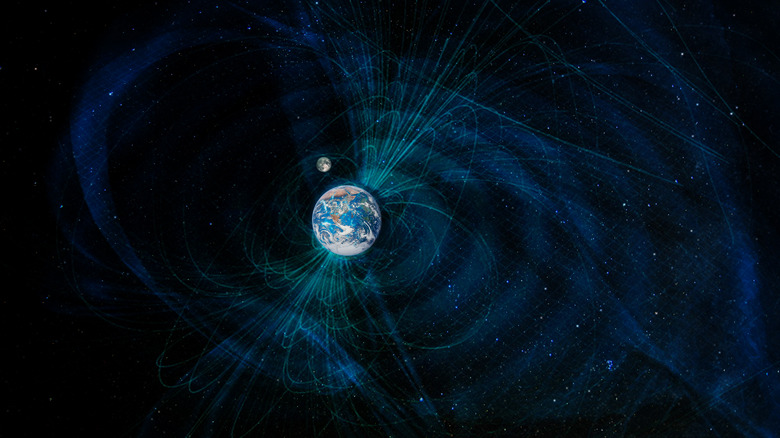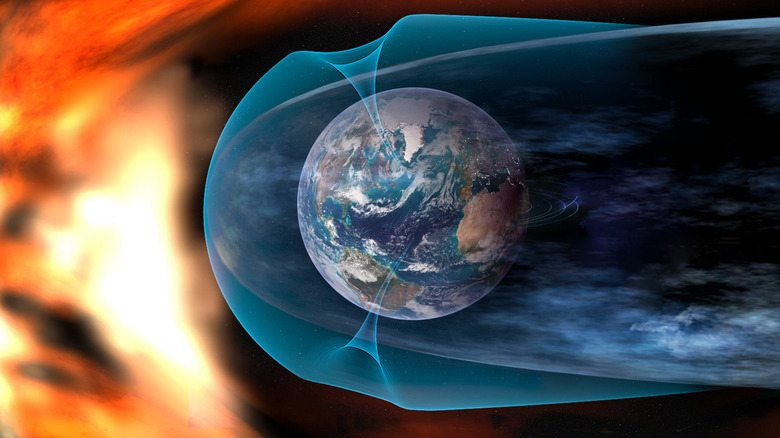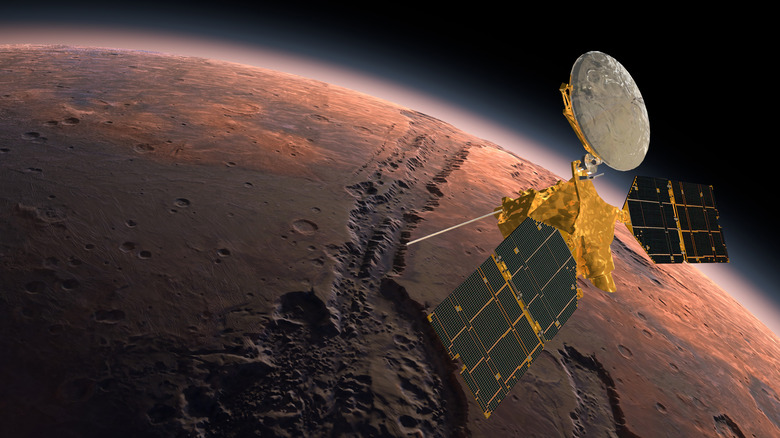Here's What Would Happen If Earth Was No Longer Magnetized
We go on with our days rarely recognizing the entrancing nature of our world. To us, the extraordinary seems mundane because it is an ordinary part of our daily lives. As the sky looms overhead as it always has, we don't anticipate that it might fall or even ponder the possibility. The fields of grassy patches underfoot are never heralded for their wonder despite the fact that they, like us, are alive.
Beyond our field of vision, many mystical elements work to hold together the very fabric of our universe. One of the least-mentioned invisible forces that we rely upon is Earth's magnetism. Planet Earth, which hosts a molten ocean at its core, is actually a giant magnet generating electrical currents (via K & J Magnetics, Inc). These currents combine to create a geomagnetic field that stretches into space for 40,000 miles and then trails off in a direction opposite of the sun for another 370,000 miles (via NASA History).
There is a region of space where this magnetic field engages in an unending battle with the sun, causing shock waves and sonic booms. However, the chemical makeup of Earth's core makes permanent magnetization a grave impossibility (via USGS). This means that at any given moment, Earth could just stop being a magnet. If that ever happened, here is the series of events that would most likely follow.
If Earth stopped being magnetized, humanity would be lost
Humanity would not necessarily be lost in a metaphorical doomsday scenario but rather in the most literal sense of the phrase. You see, navigation relies upon Earth's magnetism to work. Our compasses, digital or otherwise, are really just tiny magnets working in conjunction with the giant magnet that is our planet. According to Universe Today, the needle within a compass senses the electrical current that Earth is outputting and moves toward the poles as a reaction. If you ever watched a compass needle move and thought, "Wow, this is magic," well, truthfully, this is magnets at work.
You might automatically assume that we've moved past this little needle that functions in tandem with an invisible magnetic force, but modern technology still relies on traditional compasses for navigational accuracy. Your GPS system is merely conveying a message that was initially received through a compass — there is no needle in the sky that we know of. As such, a world without a magnetic field is one with no magnetic north, which would be a chaotic, directionless place.
Many animals would also be hopelessly lost
If you think humans could stop looking at compasses for guidance and refer to the birds for navigational cues, you're wrong. According to Forbes, birds not only use Earth's magnetic field for the purpose of migration, but they are so reliant upon this force that it's not even invisible to them. An eye protein recently identified as cryptochrome Cry4 gives these winged wonders the ability to visually perceive a blue wavelength of light emitted by the magnetosphere.
With no magnetic field to follow, birds would have quite the struggle attempting to fly south for the winter. In a reality such as this, the inevitable threat of extinction looms harshly, and the skies above are less than clear. The oceans below are no walk in the park, either.
Of course, this scenario is in no way limited to fowl. Countless animals ranging from toothy sharks to frolicking dolphins, from buzzing bees to burrowing mole rats, and even bacteria need magnetic forces to guide them along. Biologist Bryan Keller explained in an interview with Business Insider that tides and currents serve navigational purposes as well. However, according to him, it is the magnetic field that gives many maritime creatures the "map-like information" they need to survive in the deep blue.
Without our magnetic field, we would spiral through space unprotected from solar particles
Earth is truly a lost world spiraling through a vast and open galaxy without its magnetism. According to NASA Science, Earth's magnetosphere is the shield that stands between us and the charged solar particles that are constantly streaming from the sun. If that shield went down, we would all be exposed to solar and cosmic particle radiation. This would astronomically increase our risk for certain cancers, digestive diseases, and neurological disorders (via NASA).
A loss of magnetism could cause radiation to light up the skies and penetrate high-flying planes, leaving aircraft passengers vulnerable to illness. Even today, with the magnetic field intact, pilots and other airline workers are categorized as "radiation workers" under federal government guidelines (via NASA). In addition to airplane passengers and workers, birds — already flying in the wrong direction — could also collide with these super-charged radiation particles and experience gruesome fatalities.
In a sense, all living beings on Earth would be like astronauts orbiting through space without suits on, while invisible particles wreak havoc on everything.
If Earth lost its magnetism, we could experience a loss of all modern technology
Futurism explains that a decline in human health is only one aspect of a myriad of dangers we might face without the magnetosphere there to protect us from the sun — solar winds are also something to be considered. Indeed, intense solar winds have been known to stir up technological commotion by breaking power grids and rendering modern tech utterly useless.
With lights out all across the globe and the worldwide web entangled, mayhem would likely ensue. BBC reports that an apocalyptic blackout would be a true emergency for everyone. Hospitals would be unable to function. People would become trapped in tiny spaces as trains and elevators came to a screeching halt. Electrically powered sewer systems and water pumps would simply stop running.
The people of the world would stand enveloped in darkness. If history serves as a prelude, physical assaults and looting would start almost immediately after the traffic lights went down. According to CNN, one notorious New York power outage incited "a crime rampage" with 2,000 properties vandalized and 1,000 fires started. That blackout only lasted 25 hours, but it left the streets of the city covered in filth and cost the city approximately $350 million in damages and clean-up fees. And for some, the violent event proved fatal. Needless to say, an event such as this on a global scale would have unfathomable consequences.
A demagnetized version of Earth is an entirely plausible scenario
Out of every planet in our solar system, Mars is most comparable to Earth (via NASA Science). Imagery from Perseverance and other space rovers exposes the red planet's valleys, mountains, and peaks, as well as its canyons, ice caps, and seasonal changes. Based on our current knowledge of the planet, it's a place that was likely once bursting with life.
Initial evidence of a Martian magnetic field has been stored in space rocks. According to Universe Today, experts speculate that Mars lost its magnetic field about 3.7 billion years ago. This theory springs from evidence newly collected by MAVEN data via examination of the Lucus Planum lava flow. And it is largely believed that losing this magnetic field is what ultimately murdered the now red planet through a process that slowly stripped away at its atmosphere. Scientists have even discovered what appears to be a hole in the magnetic field signal on Mars. Of course, that is Mars. But what about Earth?
Live Science reports that as of 2020, NASA scientists have been scrambling to deal with a slow-moving dent in our planet's magnetic field positioned over the South Atlantic Ocean. Like most things that threaten our very existence, this dent is quiet, invisible, and not easily detected.





